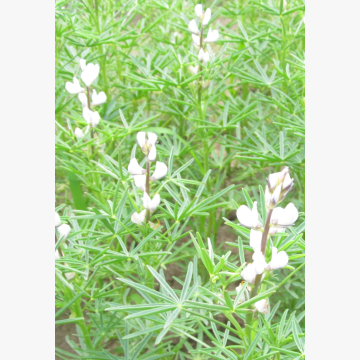- Home
- Seeds
- Spring cereals
- Narrow-leaved lupine
- Narrow-leaved lupin TANGO
Category: Spring cereals
FOR CONSULTATIONS APPLY TO:
Commercial director
Lina Smalskienė
tel. +370 618 02 551
e-mail linak@agrolitpa.lt
Sales manager
Tautvydas Kliučininkas
tel. +370 681 35 093
e-mail tautvydask@agrolitpa.lt
Sales manager
Eglė Petkevičienė
tel. +370 626 95 458
e-mail eglep@agrolitpa.lt
Sales manager
Kotryna Nakrošytė
tel.: +370 601 39 282
e-mail kotryna@agrolitpa.lt
Narrow-leaved lupin TANGO
Lupinus angustifolius L.
A mid-late sweet lupine with white flowers and seeds, and low alkaloid content, very resistant to diseases, recommended for grain production
- High and stable yield
- Medium plant height
- Very high ripening uniformity
- High resistance to lodging and drought
- White flowers
- White grains
- Resistant to sprouting
- Very high resistance to fusarium wilt and anthracnose
- Very high protein content
- Grains suitable for feeding
- Grain yield – high and stable
- Vegetation period (from sowing to technical maturity) – about 112 days (in Poland)
- Plant height – medium (61-66 cm)
- Duration of flowering – 20 days
- Flowering – medium (5 points) (late according to breeders)
- Maturity – medium (5 points) (late according to breeders)
- Resistance to lodging – very high
- Resistance to lodging after flowering – very high (8 points)
- Very resistant to lodging before harvest – 8.4 points out of 9 points
- Resistant to drought
- Resistance to diseases – very high
- The variety is highly resistant to viral diseases, anthracnose (8 points out of 9 points) and fusarium (8.2 points out of 9 points)
- Resistance to fusarium wilt – very high – 7.3-8.2 points (out of 9.0)
- Resistant to anthracnose both during pod formation and pod ripening
- Resistance to anthracnose during pod formation – very high – 8.5 points (out of 9.0)
- Resistance to anthracnose during pod ripening – very high – 8.0 points (out of 9.0)
- Resistance to gray leaf spot Stemphylium botryosum spp. – very high – 8.5 points (out of 9.0)
- Flowers – white
- Excellent evenness of grain ripening – high (7.2-7.8 points)
- Seeds – white (speckled)
- 1000 seed weight – 135-165-175 g
- Low alkaloid content – 0.039 %
- Protein content in DM – high (31.2 %)
- Cultivated for high protein content
- Excellent nutritional value of grains
- Grains are perfect for animal feed and their production because of very low alkaloid content
- For fodder purposes can be grown in mixtures with other protein plants (peas, yellow lupins)
- Requirements for soil are low
- Soil pH should be 5.0-7.4
- It is recommended to treat seeds with Rhizobium sp. bacteria (Nitragin) before sowing
- It is recommended to sow early, sowing depth 3-4 cm
- Fertilization N 0-20 kg/ha, P 50-70 kg/ha, K 60-80 kg/ha
- Suggested crop density – 90-100 plants/m2
- Can be grown for seeds, green fodder, green manure
- Suitable for green manure/catch crops
- Perfect for organic farms
The varietal parameters may differ from those indicated here when the testing circumstances differ from quondam
Recommended sowing rate: 100-120 seeds/m² or 180 (170-200) kg/ha
Recommended sowing rate when growing for green manure: 190-220 kg/ha
UAB „Agrolitpa“
Keravos sreet. 17, Kerava,
LT-38 131 Panevėžys district, LITHUANIA
Enterprise's code 168598128
VAT code LT685981219
Tel. +370 615 11 315
E. mail info@agrolitpa.lt
Keravos sreet. 17, Kerava,
LT-38 131 Panevėžys district, LITHUANIA
Enterprise's code 168598128
VAT code LT685981219
Tel. +370 615 11 315
E. mail info@agrolitpa.lt




.JPG)

